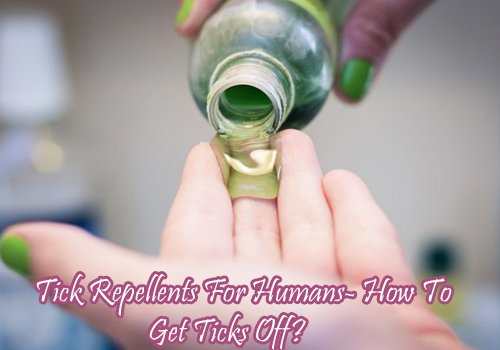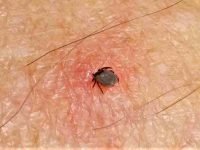This post contains affiliate links. If you click on a link and make a purchase I earn a commission at no extra cost for you.
Ticks are more common than ever because of climate change and the disappearance of their natural enemies. They wait for potential prey (questing) just about anywhere, in grasses, shrubs, around your yard, or along trails. It is essential for anyone who is into outdoor activities or just walks the dog to know what repels ticks on humans. Ticks can infect humans with bacteria and viruses and make you really sick. Appropriate clothing and using tick repellents as a precaution to prevent tick bites in humans and pets have become standard procedures. What repels ticks on humans best?
Tick Repellent for Humans
Many home remedies or “natural tick repellents” have some effect on keeping ticks at bay. But they should only be one part of a combination of measures you should use to protect yourself from ticks. More effective than those home remedies are synthetic tick repellents. They either prevent the ticks from clinging to clothing and skin through a repulsive effect or kill ticks when they come into contact with treated surfaces. But many people fear the unwanted side effects of synthetic tick repellent.
Synthetic Tick Repellents
Common tick repellents are DEET and Permethrin, and Picaridin
- DEET has long been used as a bug repellent as it works for almost all parasites, including ticks, fleas, and mosquitoes. DEET is applied to exposed skin. The Environmental Protection Agency (EPA) recommends using repellents that contain 20% or more DEET formulation.
DEET should be carefully applied on hands, neck, and other exposed areas while avoiding contact with the eyes and mouth. It is readily available in many stores under different brands of different strengths. - Permethrin is a synthetic compound in the pyrethroid family as found in the chrysanthemum flower. It is highly toxic to insects. Permethrin will kill ticks when they come in contact with it. It is recommended to wear permethrin-treated clothing when going outdoors, in addition to applying a repellent like DEET on the skin.
- Picaridin is a chemical that consists of piperidines. Icaridin “covers” human scent and prevents ticks, mosquitoes, and other biting insects from finding their victims. Products containing Picaridin are very reliable and effective.
Using DEET
Among all the other repelling methods, using a DEET-based product has been proven over many years and in millions of applications to be one of the most effective and best tick repellents.
There are many repellents containing the active ingredient DEET, whose chemical name is N, N-diethyl-meta-toluamide. They are available in different forms such as lotions, sprays, liquids, and roll-ons. The DEET products are designed in such a way that it can be applied directly to the skin or clothes.
Being a true repellent, DEET does not kill ticks or biting insects. Instead, it conceals the human smell and irritates the bug’s senses, keeping the ticks away from humans.
As the DEET products are available for mosquitoes and ticks, make sure you purchase the product specified for use on ticks.
Using Permethrin
In addition to applying personal insect repellent directly onto the skin, it is also recommended to wear protective clothing. Covering up with long-sleeved shirts, socks, and long pants makes it more difficult for ticks to find a bite site. This gives you time to find the tick and remove it.
Treating your clothes with an anti-tick spray that contains the active ingredient Permethrin helps in killing ticks and other bloodsuckers instead of just masking the human smell.
When sprayed onto clothing, the permethrin gets absorbed into the fabric and dries off in a couple of minutes. Properly treated clothing has a long-lasting protective effect.
Permethrin-treated clothing that keeps ticks and other biting insects off can be readily purchased.
Natural repellents
Natural tick repellents are mostly made using essential oils. They are considered to be safer regarding unwanted side effects than synthetic repellents, as they are herbal. However, they may not be as effective as chemical methods. Also, natural repellents need to be applied more frequently to repel effectively. They work only on the areas treated with the sprays and not on the entire body.
Important to note is that some people are sensitive to certain essential oils, and oils can cause allergies, especially in connection with the sunlight. If an oil causes a rash, reddens the skin, or feels uncomfortable, another oil must be used.
Preventing Tick Bites and what repels ticks on humans
There is no single measure to what repels ticks on humans best. There is also no single application that provides a one-hundred-percent reliable protection against tick bites. The most effective way to prevent tick bites is a combination of tick repellents and other safety precautions. This includes tightly fitting clothing, regular inspections of pant legs, and avoiding areas where ticks are lurking.
The following are a few simple tips that may reduce the risk of being bitten by ticks. The bellow list indicates measures before, during, and after outdoor activities. Some of these measures have a risk-reducing effect only in combination and are ineffective if applied solely.
- Use tick repellents. This will not only keep annoying ticks at bay but will also keep mosquitoes away
- Apply a permethrin-based tick repellent onto your shoes and trousers as the ticks adhere mostly to lower legs or feet.
- When going outdoors, wear light-colored clothes with a long-sleeved shirt. Pick a fabric that is tightly woven so as to avoid the ticks hanging onto it.
- Avoid moving through high grass or undergrowth if possible. Ticks feel especially comfortable here, waiting for a potential host to bite.
- Soon after you come home from outdoors, inspect your clothes and search your entire body for ticks. Ticks need time to crawl up your clothes and body until they find a suitable site for the bite. They prefer thin and warm skin. Search the back of your knees, the stomach and chest area, and the crotch for ticks. In children’s heads, hairlines and neck are also affected.
- Take a shower as soon as you come home.
Remember, no repellent provides 100 percent protection from tick bites. Appropriate clothing, knowing what repels ticks on humans, how ticks behave, and where they hide, are the best ways to protect yourself and your family from a tick bite and the dangerous diseases ticks can transmit.



